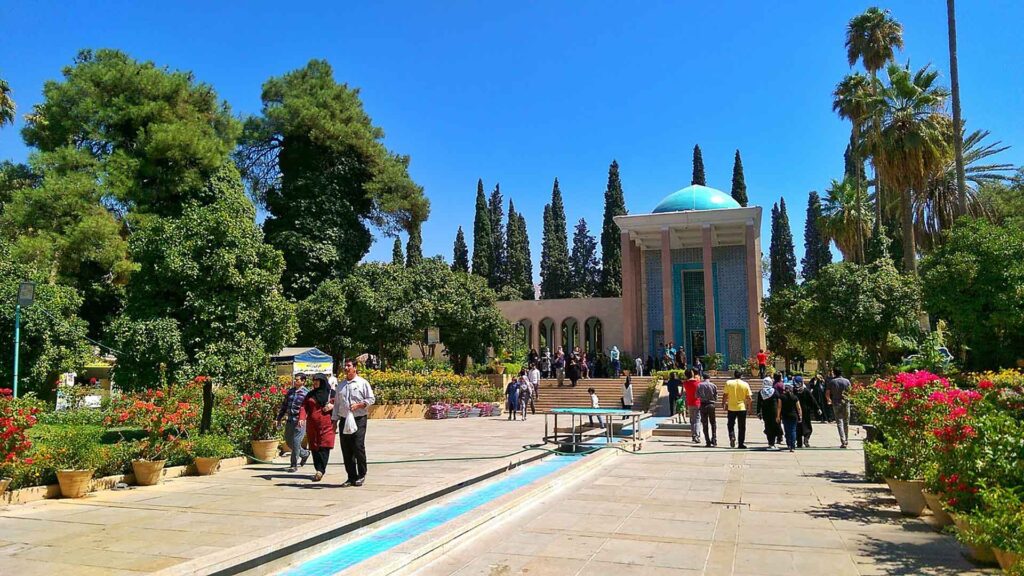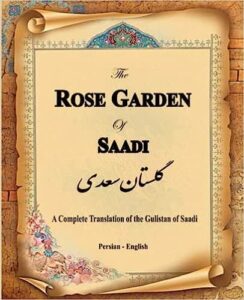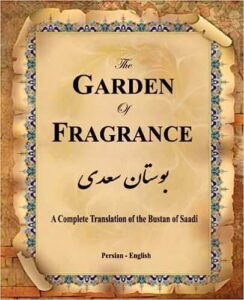Table of Contents
ToggleThemes in Saadi Shirazi’s Poetry
Saadi Shirazi, one of the greatest Persian poets, has left an enduring legacy through his profound and eloquent verses. His poetry, rich with themes of ethics, love, justice, and human nature, continues to resonate with readers across the globe. This article analyzes the themes in Saadi’s poetry, exploring how his insights reflect his time’s moral and social issues and timeless, universal truths.
Saadi Shirazi, born as Abu-Muhammad Muslih al-Din bin Abdallah Shirazi in 1210 in Shiraz, Iran, is renowned for his two major works, “Bustan” (The Orchard) and “Gulistan” (The Rose Garden). These works, written in prose interspersed with verse, explore various ethical and moral themes. Saadi’s poetry, characterized by its simplicity and depth, invites readers to reflect on the human condition and the values that guide our lives.

Ethical and Moral Lessons
Justice and Leadership
One of the central themes in Saadi’s poetry is justice and the qualities of effective leadership. In “Bustan,” Saadi emphasizes that a just ruler is compassionate, wise, and fair. He uses stories and parables to illustrate how justice leads to prosperity and harmony while tyranny results in chaos and suffering. Saadi’s reflections on justice are pertinent to rulers and individuals, advocating for fairness and integrity in all aspects of life.
Example from “Bustan”:
“If you rule, rule with justice, and hold fast / To what is right; if not, the rule won’t last.”
Love and Compassion
Saadi’s poetry frequently explores the theme of love, extending beyond romantic love to encompass compassion and empathy for all beings. In “Gulistan,” Saadi portrays love as a fundamental human experience that binds people together. His emphasis on compassion and empathy reflects his Sufi beliefs, which advocate for a deep connection with humanity and the divine.
Example from “Gulistan“:
“Human beings are members of a whole, / In creation of one essence and soul.”
Contentment and Simplicity
Another significant theme in Saadi’s work is contentment and the virtues of a simple life. He often criticizes greed and materialism, suggesting that true happiness comes from being content with what one has. Saadi’s stories and aphorisms highlight the value of humility and the dangers of excessive ambition.
Example from “Gulistan”:
“The contented mind is always rich; / The greedy soul is always poor.”
Human Nature and Social Critique
Human Frailties
Saadi’s keen observation of human nature allows him to address common human frailties such as hypocrisy, arrogance, and ignorance. He critiques these flaws through his poetry and encourages self-awareness and personal growth. Saadi’s reflections on human weaknesses are often tempered with humor and empathy, making his critiques both sharp and compassionate.
Example from “Gulistan”:
“The world is a rose, smell it and pass to your friends / Or drink from the water of life and share with others.”
Social Justice and Equality
Saadi’s poetry also touches on social justice and equality. He advocates for the rights of the poor and the oppressed, calling for compassion and support for those in need. His works often highlight the moral responsibility of individuals and society to uphold justice and fairness.
Example from “Gulistan”:
“The rain, it falls upon the just / And also on the unjust fellas. / But mostly on the just, because / The unjust have the just’s umbrellas.”
Spiritual and Mystical Themes
Divine Love and Sufism
As a Sufi, Saadi’s poetry is imbued with spiritual and mystical themes. He explores the soul’s journey towards the divine, the transient nature of worldly life, and the profound joy of spiritual union with God. Saadi’s mystical poetry reflects his belief in the interconnectedness of all creation and the ultimate unity with the divine.
Example from “Bustan”:
“I am the servant of the Qur’an as long as I have life. / I am the dust on the path of Muhammad, the Chosen One.”
The Transience of Life
Saadi frequently reminds readers of life’s transient nature and death’s inevitability. His reflections on mortality encourage readers to live virtuously and seek spiritual fulfillment. Saadi’s meditations on the fleeting nature of life are often poignant, urging a focus on what truly matters.
Example from “Gulistan”:
“A traveler who does not reflect on his destination / Will not reach his desired journey’s end.”
Literary Style and Influence
Aphorisms and Storytelling
His use of aphorisms and storytelling marks Saadi’s literary style. His ability to convey deep philosophical and ethical insights through simple, memorable statements makes his work accessible and impactful. Saadi’s use of stories and parables to illustrate his points adds a narrative richness to his poetry, making his moral lessons engaging and relatable.
Global Influence
Saadi’s influence extends far beyond Persian literature. His works have been translated into numerous languages and continue to be studied and admired worldwide. Saadi’s themes of justice, love, and human nature resonate universally, making his poetry relevant across cultures and eras.
Saadi Shirazi’s poetry offers a rich tapestry of themes that reflect his time’s moral and social issues and timeless, universal truths. His reflections on justice, love, contentment, human nature, and spirituality continue to inspire and enlighten readers. By exploring Saadi’s poetry through an analytical lens, we gain a deeper understanding of his insights and the enduring relevance of his work.








